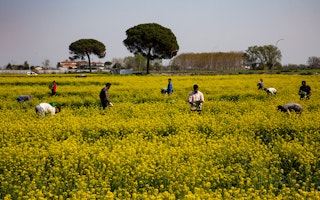Civil Society Steps In to Support the Hungary Train Station Refugees
By Antonia Zafeiri

Amid scenes of confusion and despair, thousands are fleeing war and persecution to seek protection in Europe. Many of them cross through Hungary, and have become desperately stranded in the train system in Budapest. With acts of goodwill large and small, civil society is stepping in to help. Andras Kovats and his team, Menedek Hungarian Association for Migrants, are on the ground, providing counseling services to those in need.
Why are these refugees stuck in Budapest’s train stations? And what are you seeing on the ground?
The concentration of all these people in Budapest’s train stations is due to the lack of a straightforward response from the police and asylum authorities. The situation changes daily and nobody is fully up to date. The authorities send mixed messages which have created this chaos. One day people are allowed to board trains so everyone rushes to the station, the next day trains are barred and people are stranded.
How did they end up here in the first place?
Around 3,000 refugees—mostly Syrians and Afghans—cross the Serbian-Hungarian border daily. Most cross on foot, avoiding official crossing points. They are forced into illegality as they do not have valid travel documents. Once in Hungary most are apprehended by the police. If they are eligible to apply for asylum then the asylum authorities take over. In most cases people are simply given a designation order directing them to a refugee center. This is the point when most people, once released, instead of going to the refugee reception centers—which are overcrowded and cannot host more people—end up in the railway station trying to move on to Germany or Austria.
How are Hungarians reacting to this growing influx of refugees?
Civil society organizations have been in the field since the whole thing started in spring. More recently aid organizations like the umbrella group Migration Aid mobilized in designated zones set by the municipality. They established distribution points for food and other basic amenities. It can get very hectic—a lot depends on outside factors such as the weather, or how many donations come in. Sometimes there is an abundance of food, other times a shortage. The new trend in the last two weeks is that there is regular medical care, with doctors available to treat emergencies.
At the level of ordinary citizens, people started to mobilize once the problem became more visible: individuals who make anonymous donations, or show up to hand out water and food. The most touching part is that you literally see all sorts of people coming to help: families, elderly, teenagers, businessmen showing up to offer water or a bag of clothes. But nothing is safe or fixed. The dominant feeling is insecurity. Those with a firm anti-refugee stance harass the refugees and obstruct those who try to help. There is no outright violence, but the situation is tense and changing by the minute. Smugglers operate uninterrupted, giving out mobile phones, contact numbers, train tickets, taking individuals or groups to cabs and vans—you can see all this in front of your eyes.
The spontaneous gestures of solidarity make me hopeful. Has this led to a more organized call for a sustainable solution?
In my opinion, people’s motivations are mixed. The strongest drive is humanity and philanthropy. Families on our doorstep are hungry, thirsty, completely lost, and naturally people want to help. But many people joined this movement—if we can call it that, since it’s not a coordinated act and still very grassroots—as a form of political protest, to express dissent at the way the government handled the situation.
The dominant message is that the civil society is doing the work the government is reluctant or unwilling to do, and covering for the shortages of the state.
Apart from supporting those in need, what changes need to be made at the policy level?
It’s ironic, but right now in Hungary we are advocating against changes in the migration policies since the recent changes introduced by the government have only been negative. The asylum and migration laws are becoming more and more restrictive. We are trying to stop this trend.
We need to build the capacity of the current asylum system. More accommodation, more vacancies, and more personnel are needed. It’s a question of numbers, not of changes in laws and rules. It’s worrying how the government has failed to do its duty. Instead of allocating more resources and building institutional capacity, it introduces restrictive rules, making all kinds of legal and physical obstacles for those who are in clear need of protection.
Beyond Hungary, what is the responsibility of other EU member states?
Of course there is the European dimension to all this. Most EU member states—except a very few, like Germany—try to avoid their responsibility. The present European asylum system is just not based on equity and justice.
Instead of assigning blame, we should try to make the whole system much more coordinated. It’s the flaws and rigid regulations of the current system that have forced those reaching the EU to become cheaters. Refugees are people who should be able to make a decision about where they live and which society they contribute to based on freedom and not restrictive rules.
Menedek Hungarian Association for Migrants is a grantee of the Open Society Foundations.
Until April 2016, Antonia Zafeiri was a European communications officer at the Open Society Foundations.


